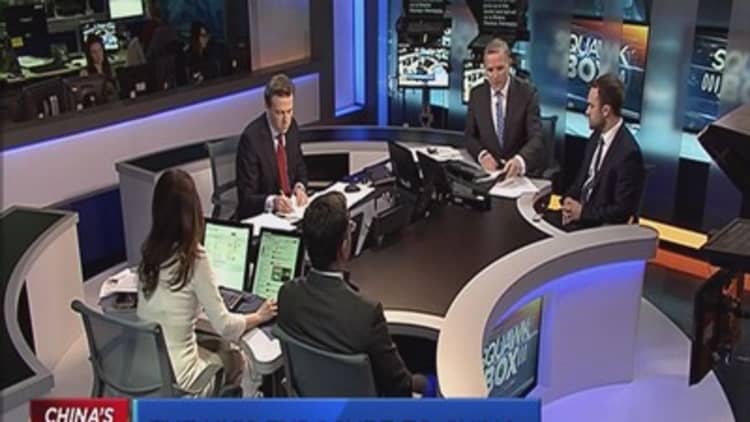
The U.K.'s rush to embrace trade with China in recent years has raised its exposure to the market turmoil surrounding the world's second largest economy.
On Monday, stocks listed on London's benchmark FTSE 100 lost a combined £74 billion ($117 billion) in the index's 10th successive day of falls, after concerns about China's economy caused panic in stock markets.
George Osborne, the U.K.'s Chancellor of the Exchequer, told reporters on Monday: "I would take it as a reminder that we are not immune from what happens in the world.
"Britain is a very open economy…so we are affected by what happens, whether it's problems in the euro zone, problems in Asian financial markets."
The U.K. has courted Chinese trade, in everything from financial services to pig semen, assiduously in recent years. While the U.K.'s financial sector has shrunk its exposure to most foreign countries since the 2008-2009 credit crisis, loans to China have almost quadrupled since then, according to RBS.
Osborne himself has been at the forefront of attempts to make London a hub for renminbi trading – which looks like a much less lucrative business after this month's turmoil.
The benchmark Shanghai Composite index sunk once again on Tuesday, closing down by 7.6 percent, at its lowest since December 2014.
Later in the day, China cut interest rates for the fifth time in nine months, in a new effort to shore up slowing economic growth. The central bank also increased the amount of money available for lending, by reducing the minimum reserves banks are required to hold.
"The fear is this is another crisis, a repeat of Asia in the 1990s. It's not that way yet, this is growing pains for China. It's a difficult period, but the feeling is that it will make it. It's going to be very difficult," Marcus Wright, economist at RBS, told CNBC.
He described what he termed China's five channels: Growth; trade; inflation; interest rates and financial links – and said financial links were "the fifth and final concern".
Mark Carney, the governor of the Bank of England, identified a China slowdown as one of the key international risks facing the U.K. economy, with the potential to impact the bank's interest rate decisions.
Of course, there could still be some movement from the Chinese authorities to address market concerns about the devaluation of the yuan and whether its economic growth is slowing more than expected.
"China slowing down is inevitable, so if you're going to try and pump it up with equity bubbles, it's going to be that much harder. Does it need to pump up the stock market? Absolutely not," Bhanu Baweja, global head of emerging markets cross asset strategy at UBS, told CNBC.
And in the long term, chasing China may still turn out to be a good move.
"There's going to be a very steady transition. The Chinese authorities are very conscious of some of the mistakes made by their neighbors. They're going to go at a very slow pace," Wright said.
"China has had its growing pains, and it's going through another one right now."
- By CNBC's Catherine Boyle




